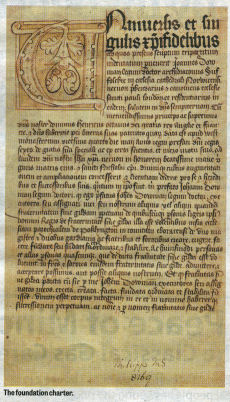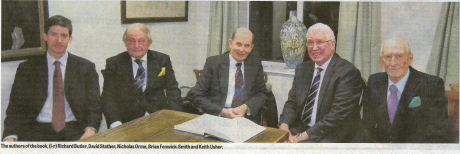 Pocklington School and its alma mater, St Johns College, Cambridge, possess a marvellous collection of original and copied Tudor documents about the school. Pocklington School and its alma mater, St Johns College, Cambridge, possess a marvellous collection of original and copied Tudor documents about the school.
They include a royal writ and letters patent going back to Henry VIII, giving permission for the school being established in 1514, a deed of 1525 creating five scholarships for a succession of Pocklington boys to go to Cambridge, and more letters patent of 1552 which contain a copy of the Act of Parliament that re-established the school after it had faced an uncertain future due to the abolition of guilds.
The archives are supplemented by copies of property deals and financial endowments, correspondence about appointments and errant headmasters, and disputes settled in court from the 16th century onwards.
The one major, and frustrating, omission from this collection of early documents had been the foundation charter of John Dowman (or Dolman), the Tudor lawyer and church official who made his fortune in the south of England before deciding to create a ‘Free Grammar School’ in his home town of Pocklington.
For more than a century the school believed that the charter had been lost or destroyed, but it suddenly ‘reappeared’ in 2009, just in time for the school’s 500th anniversary, and has now prompted the publication of a new book, ‘The Foundation Documents of Pocklington School’, by a trio of former Pocklington pupils of the 1940s and 1950s.
The work of translating and interpreting the 22-page charter, which is mainly in Latin with a small section in English, has been undertaken by David Stather, of Wilberfoss. Stather was keen on both Latin and history when he was a schoolboy, travelling by train every day from his home in Market Weighton. While still at school he combined forces with his classmate, Geoffrey Cox, to write and publish ‘A History of Market Weighton’, and then went on to have a long career as a lawyer before retiring to Wilberfoss. Assisting him in the translation has been Keith Walls, another schoolmate who maintained his interest in classics during his career in teaching, both in England and abroad, before returning home to Market Weighton. The pair have consulted throughout, with Stather being responsible for five of the six documents, and Walls translating the scholarship deed.
The publishing of the book is down to a further Old Pocklingtonian contemporary and school benefactor, Brian Fenwick-Smith, who was born in Hull, became an international businessman, and is now based in Monte Carlo.
All three returned to Pocklington recently to present their handiwork to the school and meet up with Nicholas Orme, Canon Professor of History at Exeter University, who has written the introduction to the book, and Richard Butler, from St Johns College, Cambridge, the editor of the volume.
Professor Orme, a renowned expert in medieval education and schools, believes the Pocklington documents are of national importance for what they tell us about the circumstances of Tudor grammar schools.
When the school’s first full history was compiled, in 1950, it categorically stated that the foundation statutes had been lost.
And that was still believed to be the case until 2009 when a contemporary copy of Dolman’s foundation document was ‘rediscovered’ by old boys Christopher Dent and Phil Gilbank.
In fact it had been sitting on the shelves at St Johns all along - the document, dated February 1517 but seemingly a copy from a few years later, had survived in private hands before appearing in a book sale in London in 1908.
It was bought by the then Master of St Johns for his personal collection, before he donated it to the college library in 1921.
Sometime in this journey the foundation charter was missed out when the college archives were catalogued, and it was only in recent years that the omission was corrected and the document ‘reappeared’.
The rediscovery was just in time to enable it to be translated and interpreted, and for the first time in 500 years the school can now read in English the original words and instructions of its founder.
It remains a mystery as to why the copy was made and how it survived - the three original charters setting out the terms for establishing both a guild and the school may well have been destroyed when religious guilds were abolished by King Edward VI in 1547 - but it provides a unique insight into Dolman’s Tudor grammar school, detailing how his school was to be managed, and what was expected of both the pupils and master.
The school was established and overseen as part of a guild based in All Saints’ Church, Pocklington, though the charter also makes clear that the school itself has been on the present West Green site since its foundation (it is named ‘Westgrene in the parish of Poklyngton’ in the document).
The school’s first headmaster, Walter Carr, was appointed by Dolman himself, who stated that the master of his school should be ‘good, honourable, proved, irreproachable and learned and erudite...in the science of grammar’.
He was paid £10 per annum, had to swear an oath of induction, was required to live at the school, and had to give a year’s notice if he wanted to leave.
‘Grammar’ meant Latin, which was at the centre of everything to do with the school.
The curriculum was entirely Latin, and pupils read, wrote and spoke in Latin, which was the language of the church and the professions.
There were likely other elementary, or petty, schools in Tudor Pocklington, which in the 16th century was the East Riding’s third biggest settlement, teaching local youngsters basic reading and writing.
But Dolman’s grammar school was to be a more advanced educational institution, nobody could get into university without being skilled in Latin, and Dolman’s school was geared up for boys to go on to Cambridge and a career in the church.
His scholarships, for ‘wholly superior grammarians...who are more outstanding and in their character more cultured’, were aimed for ‘the increase of clerks’.
The teaching at the new Pocklington school was totally free (there were about 100 English grammar schools in the early Tudor period and many did charge fees).
The charter states that lessons started at 6am and went on until 6pm (although there was a two hour break for lunch) with every day beginning with prayers in the schoolroom.
School was six days a week, and the scholars had to go over to church, two by two, every Friday and Saturday for mass.
On their day off on Sunday they were expected attend church service in both the morning and afternoon.
Tudor schoolboys (girls were not educated in grammar schools) sat on forms in the single schoolroom, and boys were called to the master who sat in his raised chair at the end of the room to have their work examined and be questioned.
Any mistakes were punished by being birched on the bottom, with more serious bad behaviour, in or out of school, receiving greater punishment.
According to the charter boys ‘given to so great insolence or wantonness within the school aforesaid or without’, must be reported to the master, who should ‘duly correct and chastise such scholar himself and indeed make him forbear such abandoned acts.’
If this was not effective the ‘incorrigible scholar’ had to be expelled. Dolman also set out which Latin text books were to be used in his school.
At the time new, ‘humanist’ Latin works were becoming commonplace in schools across Europe, but Dolman insisted his
schoolmaster stuck with traditional Roman-Christian texts.
There is an underlying scholarly and religious seriousness expected of his pupils as he forbade what he described as ‘lascivious’ material that was becoming popular in other grammar schools; with the Roman playwright, Terence, singled out. Dolman banned: ‘things lascivious and provoking in the comedies of Terence, or in music or poetry or songs’.
Stather, explained how he publication came about. “After retiring Keith and I met up, and we started translating medieval documents as a sort of hobby.
“We had heard about the discovery of the charter, then I was volunteered to get involved and it grew from there. “It has been quite a challenge, but Brian has done a wonderful job in bringing it to fruition and I’m delighted with the end result.”
The printing of the book ends a major commitment for Stather, however, he has already moved on to listing and making sense of the lands and endowments that funded the school in its early centuries.
The current headmaster of Pocklington School, Mark Ronan, welcomed the new publication, saying: “The documents explain the history of the foundation of the school and give us an insight into the extraordinary drive and generosity of our founder, John Dowman, and of his kinsman, Thomas Dowman, our ‘second founder’.
“We now have, for the first time, translations of all of them, thanks to months of dedicated work by two other OPs David Stather and Keith Walls.
“On behalf of the school I thank all those who have played their part in the project.”
The documents have been published as a high quality, limited edition book, and some copies are available for purchase from the school archivist, Angie Edwards.

The authors pictured before presenting their work to the school, who are (left to right): Richard Butler, David Stather, Nicholas Orme, Brian Fenwick-Smith and Keith Walls.
|

